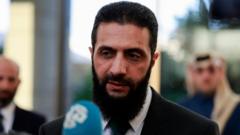New elections in Syria may take as long as four years to materialize, according to Ahmed al-Sharaa, the leader of the rebel faction Hayat Tahrir al-Sham (HTS). In a revealing interview with Saudi state broadcaster Al Arabiya, Sharaa provided a timeline for the political restructuring of the war-torn nation for the first time since HTS ousted former President Bashar al-Assad during a recent offensive.
Sharaa stated that the drafting of a new constitution could require up to three years. He also mentioned that citizens might not see significant improvements in public services until a year after the transition from Assad's regime. Highlighting the importance of establishing a legal framework, Sharaa noted that a thorough population census would be essential for conducting credible elections.
Sharaa, whose real name is Abu Mohammed al-Jolani, has emerged as a key figure in the governance of Syria following Assad's downfall. The timeline he provided underscores the challenges ahead, particularly in a country characterized by significant ethnic and religious diversity. The HTS, which has undergone a transformation from its jihadist roots, now asserts a commitment to protecting the rights of minorities amid efforts to govern a multi-ethnic society.
Prominent regional and international observers are also closely watching the upcoming national dialogue conference, where HTS is expected to announce the dissolution of its group, signaling a pivot towards more inclusive governance. In the face of criticism regarding the formation of a transitional government, Sharaa defended the appointments as "essential" for the country's unity.
Recent reports from the Syrian Observatory for Human Rights indicated that nearly 300 individuals connected to Assad's regime have been arrested, including informants and former soldiers, reflecting the tense political climate. Local populations reportedly assisted in these arrests, which could suggest a shifting public sentiment towards the new leadership.
The situation in Syria remains fluid, and the success of the HTS-led transitional government will heavily depend on its ability to navigate the intricacies of national reconciliation and meet the demands of a diversified population, all while establishing a legitimate democratic process.




















